- Home
- Markus Zusak
I Am the Messenger Page 11
I Am the Messenger Read online
Page 11
"O'Reilly, O'Reilly..."
I'm going through the local phone book. It's midday. I've slept.
There are two T. O'Reillys. One in the better part of town. One in the slummy area.
That's the one, I think. The slummy one.
I know it.
To make sure, I go to the uptown address first. It's a nice cement-rendered house with a big driveway. I knock at the door.
"Yeah?"
A tall man opens up and stares at me through the flyscreen. He wears shorts, a shirt, and slippers.
"Sorry to bother you," I say, "but--"
"You selling something?"
"No."
"You a Jehovah?"
"No."
He's shocked. "Well, in that case, you can come in." His tone has changed immediately and his eyes are friendly for the first time. It makes me consider accepting his offer, but I decide against.
We remain on either side of the flyscreen door. I wonder how to do this properly and decide that straight out is probably best. "Sir, are you Thomas O'Reilly?"
He comes forward and waits a moment before answering. "No, mate, I'm Tony. Thomas is my brother. He lives down in some Henry Street shithole."
"Okay, sorry to keep you," and I start to leave. "Thanks."
"Hey." He opens the door and walks after me. "What is it you want with my brother?"
I pause. "I don't know yet."
"As long as you're going down there," he says, "could you do me a favor when you see him?"
I shrug. "No worries."
"Could you tell him greed hasn't swallowed me up yet?" The sentence lands between us like a ball with no air in it.
"Sure. No problem."
I'm nearly out the gate when Tony O'Reilly calls out one last time. I turn back to face him.
"I think I should warn you." He comes closer. "My brother's a priest."
We're both completely still for a few seconds as I consider it. "Thanks," I say, and move from the driveway.
I walk away, thinking, It's still better than a wife-beating rapist.
"How many times do you want me to tell you?"
"You're sure now?"
"It's not me, Ed. If it was me, I'd tell you."
I'm having this conversation with my brother, Tommy, on the phone. My thoughts have wandered toward him after being led to the river and the stones of home. To my knowledge, Tommy's the only other person who knows we went there since we never told anyone. We always thought we'd get a good hiding for going that far up the river alone. Then again, maybe someone knew but chose to ignore it. We could both swim.
Earlier, I told him about the cards, to which he said, "How does this sort of thing always seem to happen to you, Ed? If there's anything weird floating around, it always manages to land on you. You're like a weird-shit magnet."
We laughed.
I thought about it.
Taxi driver. Local loser. Cornerstone of mediocrity. Sexual midget. Pathetic cardplayer. And now weird-shit magnet on top of it.
Admit it.
It's not a bad list I'm building up.
"How are you, Tommy, anyway?"
"All right. You?"
"Not bad."
End of conversation.
It's not Tommy.
We've had a bit of a cardplaying drought lately, so Marv organizes a big night. The decided venue is Ritchie's place. His folks have just gone on holiday.
Prior to going to Ritchie's, I head over to Henry Street and have a look for Thomas O'Reilly. As I walk there, my stomach fidgets inside me and my hands search for my pockets. The street's a complete shocker and has always been renowned for it. It's a place of broken roof tiles, broken windows, and broken people. Even the father's house is pretty objectionable. I can already tell from a distance.
The roof is corrugated, red, and rusty.
The walls are a dirty white fibro.
Blistered, sore-looking paint.
Crippled fence, struggling to remain standing.
And a gate that's in agony.
I'm nearly there when I realize there's no way I'm going to make it.
Three very big men step out of an alley and start asking me for things. They never threaten, but their presence alone makes me feel very awkward and alone.
"Hey, man, you got forty cents?" asks one of them.
"Or cigarettes?" says the next.
"Do you really need that jacket?"
"Come on, man--one cigarette. I know you smoke. It ain't gon' kill you to lend me just the one...."
I freeze for a moment, turn, and walk away.
Very bloody quickly.
At Ritchie's, I keep reliving it while the others deal and talk.
"So where'd your folks go, Ritchie?" Audrey asks.
There's a lengthy gap as he considers the question. "I have no idea."
"You're joking, aren't you?"
"They told me, but I must have forgot."
Audrey shakes her head, and Marv laughs through his cigar smoke.
I think of Henry Street.
Tonight I win for a change.
A few rounds pass me by, but somehow I manage to win the most games out of all of us.
Marv still talks contentedly about the upcoming Sledge Game. "Did you hear?" he puffs at Ritchie and me. "The Falcons have got a new guy this year. People are saying he's something like one fifty."
Ritchie: "One fifty what? Kilos?"
Like Marv and me, Ritchie's played the last few years, on the wing, but he's even less interested than me. To give you an idea, he usually shares a beer or two with the crowd during the game's flat spots.
"That's right, Ritchie," Marv affirms. This is serious business. "One fifty big ones."
"You playing, Ed?"
That question comes from Audrey. She knows I am but asks only to comfort herself with me. Ever since the front-door just-Ed incident she hasn't really known what to say to me. I look up at her from the table and half smile. She knows it means we're okay.
"Yes," I tell her. "I'll be there."
Her smile back says, That's good. Good that we're okay, that is. Audrey couldn't care less about the Annual Sledge Game. She hates soccer.
Later, when the cards are over, she comes back to my place and we drink in the kitchen.
"New bloke still going well?" I ask. I'm emptying toast crumbs into the sink. When I turn around to meet her answer, I notice some dried blood on the floor. Blood from my head among all the dog hair. Reminders are everywhere.
"Not bad," she answers.
I want to tell her how sorry I am for showing up like I did the other morning, but I choose not to. We're okay now, and there's no point going over something I can't change. I come close a few times but let it go. It's better that way.
When I put the toaster back down in its familiar place, I catch my reflection in it--even if it is a touch filthy. My eyes are uncertain to the point of being injured. For just that instant I see the pitiful nature of my life. This girl I can't have. These messages I feel I can't deliver.... But then I see the eyes become determined. I see a future version of myself going down to Henry Street again to see Father Thomas O'Reilly. I'll be in my dirty old jacket, moneyless and cigaretteless, same as last time. Only next time I plan to make it to the front door.
I have to, I think, and I speak to Audrey.
"I know where I have to go," I tell her.
She sips on the grapefruit Sub I gave her and asks it. "Well, where?"
"Three more people."
The scratched names on the giant stone appear in my mind, but I don't speak them to her. Like I've said, there's no point.
She's dying to ask the names.
I can tell.
Not a solitary word makes it out of her mouth, though, and I must say this for Audrey--she never forces things. She knows I'll tell her nothing if she pushes too hard.
The one thing I do tell her is where I found the names.
"I had a runner, and that's where he went...."
; All Audrey can do now is shake her head. "Whoever this is sure is going to a lot of trouble."
"They also seem to know me unbelievably well--almost as well as I know myself."
"Yeah, but," Audrey begins, "who knows you real well, Ed?"
And that's just it.
"No one," I say.
Not even me? the Doorman walks in and asks.
I look back and reply.
Look, pal--a few cups of coffee don't mean you know me.
Sometimes I don't even think I know myself.
My reflection finds me in the eyes again.
But you know what to do, it says.
I agree with it.
I get to Henry Street the next night after work and make it to the front door, and I must say, Father O'Reilly's house gives new meaning to the word atrocious.
I introduce myself, and without much more, the father invites me in.
Without even thinking, I speak, in the hallway.
"Jesus, it wouldn't kill you to clean the place once in a while, would it?"
Did I just say that?
But I don't need to worry because the father responds immediately.
"Well, what about the state of you? When was the last time you washed that jacket?"
"Good point," I say, thankful for his quick reply.
He's balding, the father, and about forty-five. Not quite as tall as his brother, and he has bottle green eyes and fairly big ears. He's wearing a robe, and I wonder why he lives here and not at the church. I always thought priests lived at the churches so people could go there if they needed help or advice.
He leads me into the kitchen and we sit down at the table.
"Tea or coffee?" The way he says it, it's like I have no choice in the fact that I'm having something. It just depends which.
"Coffee," I reply.
"Milk and sugar?"
"Yes, please."
"How many sugars?"
I'm a bit embarrassed about this. "Four."
"Four sugars! What are you, David Helfgott?"
"Who the hell's that?"
"You know--piano player, half crazy." He's astounded I don't know. "He used to have about a dozen cups of coffee a day with ten spoons of sugar in each."
"Was he good?"
"Well, yes." He puts the kettle on. "Crazy but good." His glassy eyes are of kindness now. A giant kindness. "Are you crazy but good, too, Ed Kennedy?"
"I don't know," I say, and the priest laughs, more to himself than anyone else.
When the coffee's ready, the father brings it over and sits down with me. Before he takes his first sip, he asks, "You get hassled for smokes and money out there?" He jerks his head back toward the street.
"Yeah, and one guy keeps asking me for my jacket."
"Really?" He shakes his head. "God knows why. No taste, I suppose." He drinks.
I look down at my arms. "Is it really that bad?"
"Nah." He speaks earnestly now. "I'm only messing with you, son."
I examine the sleeves again and the material next to the zipper. The black suede is almost worn through.
An uneasy quiet gets between us. It tells me it's time to get down to business. I think maybe the father can feel it, too, and the expression on his face is of curiosity, yet patience.
I'm about to speak when an argument breaks out in one of the neighboring houses.
A plate smashes.
Screams jump over the fence.
The fighting intensifies, voices slam, and doors shout shut.
The father notices my concern and says, "Just hang on a sec, Ed." He walks to the window and opens it wider. He yells. "Can you two do me a favor and calm down!" He persists. "Hey, Clem!"
A murmuring crawls to the window now, followed by a voice. "Yes, Father?"
"What's going on over there today?"
The voice answers. "She's getting on my nerves again, Father!"
"Well, that's obvious, Clem, but what about--"
Another voice arrives. A woman's. "He's been up at the pub again, Father. Drinking and doing all that gambling!"
The father's voice becomes reverend. Honorable and firm. "That true, Clem?"
"Well, yeah, but--"
"But nothing, Clem. Stay in tonight, okay? Hold hands and watch television."
Voice 1: "Okay, Father."
Voice 2: "Thanks, Father."
Father O'Reilly comes back to me then, shaking his head. "Meet the Parkinsons," he says. "They're bloody useless." His comment shocks me. I've never heard a priest talk like this before. In fact, I've never spoken to one at all, but surely they're not all like this.
"Does that happen often?" I ask.
"Couple of times a week. At least."
"How do you live with that?"
He simply holds out his arms, motioning to his robe. "That's what I'm here for."
We talk for a while, the father and me.
I tell him about cab driving.
He tells me about priesting.
His church is the old one at the edge of town, and I now realize why he's chosen to live here. The church is too far away for him to really help anyone, so this is the best place for him. It's everywhere, on all sides and angles. This is where the father needs to be. Not in some church, gathering dust.
Sometimes I wonder about the way he speaks, which is confirmed when he explains the church to me. He admits that if his church was any kind of shop or restaurant, it would have closed down years ago.
"Business no good lately?" I ask.
"The truth?" The glass in his eyes breaks and punctures me. "Shithouse."
That's when I have to ask him. "Can you really talk like that? Being holy and all?"
"What? Because I'm a priest?" He finishes the dregs of his coffee. "Sure. God knows what's important."
It's a relief at this point that he doesn't go on about God knowing all of us and the rest of that particular sermon. He doesn't preach, ever. Even when we both have nothing more to say, he looks at me with finality and says, "But let's not get caught up in religion today, Ed. Let's talk about something else." He turns slightly formal now. "Let's talk about why you're here."
We stare across the table.
Just briefly.
At each other.
After a long drawn-out silence, I confess to the father. I tell him I still don't know why I'm here. I don't tell him about the messages I've already done or the ones still left to do. I only tell him that I have a purpose here and that it will come to me.
He listens very intently, with his elbows on the table, his hands together, and his fingers entwined beneath his chin.
A while passes until he knows I have very little else to say. He then speaks very calmly and clearly. He says, "Don't worry, Ed. What you need to do will certainly arrive in you. I've got a feeling it has in the past."
"It has," I agree.
"Just do me a favor and remember one thing," he says, and I can see he's trying not to be too typically religious. "Have faith, Ed, all right?"
I search the coffee mug, but there's none in there.
He walks me out of his house and up the street. Along the way, we come across the cigarette, money, and jacket scabs, and the father rounds them all up and gets them together.
He says, "Now listen up, boys. I want you to meet Ed. Ed, this is Joe, Graeme, and Joshua." I shake all their hands. "Fellas, this is Ed Kennedy."
"Nice to meet you, Ed."
"Hi, Ed."
"How's it going, Ed?"
"Now you guys remember something." The father speaks sternly now. "Ed here is a personal friend of mine, and you're not to ask him for cigarettes or money. And especially not for his jacket." He flashes me a quick grin. "I mean, look at it, Joe. It's an outrage, isn't it? It's downright bloody awful."
Joe agrees with gusto. "It sure is, Father."
"Good. So we understand each other?"
They all understand.
"Good." The father and I progress to the corner.
We shake
hands and say our goodbyes, and the father's nearly out of sight when I turn around upon remembering his brother. I run back, calling out, "Hey, Father!"
He hears me and swivels.
"I nearly forgot." I stop running and stand about fifteen meters in front of him. "Your brother." The father's eyes reach a little closer. "He said to tell you that greed hasn't swallowed him yet."
The priest's eyes lighten then, with a touch of regret poured gently into them. "My brother, Tony..." His words are soft, and they hobble toward me. "I haven't seen my brother in a long time--how is he?"
"Not bad." I say it with a confidence I don't understand. Only gut feeling tells me it's the right answer, and we stand there now, among awkwardness and the rubbish.
"You all right, Father?" I ask.
"I am, Ed," replies Father O'Reilly. "Thanks for the concern."
He turns and walks away, and for the first time, I see him not as a priest.
I don't even see him as a man.
At this moment, he's just a human walking home on Henry Street.
Complete contrast now.
I'm at Marv's place, watching Baywatch with the sound down. We don't care about the plot or the dialogue.
We're listening to his favorite group, the Ramones.
"Can I put something else on?" Ritchie asks.
"Yeah, put Pryor on," Marv says. We even call Jimi Hendrix Richard Pryor these days. "Purple Haze" starts up, and he says, "Where's Audrey?"
"I'm here." She walks in.
"What's that smell?" Ritchie asks. He cringes. "It's familiar."
Marv knows, without doubt, and he points a finger at me. Accusingly. "You brought the Doorman, didn't you?"
"I had to--he was looking lonely when I left."
"You know he isn't welcome here."
The Doorman's at the open back door, looking in.
He barks at Marv.
The only person he barks at.
"He doesn't like me," Marv points out.
Another bark.
"It's because you give him dirty looks and put shit on him all the time. He understands, you know."
We argue awhile longer, but Audrey breaks it up by dealing out the cards.
"Gentlemen?" She clears her throat.
We sit down, and I pick up.
In the third game, I pick up the Ace of Clubs.
Father O'Reilly, I think.
"What are you doing this Sunday, Marv?"
"What do you mean, what am I doing on Sunday?"
"What do you think I mean?"
Ritchie says, "I swear you're a goose, Marv. I believe Ed is simply asking if you're busy this Sunday."
Marv points at Ritchie now. He's all hostile today because I brought the Doorman along. "Don't you start on me, either, Pryor." Now he looks at Audrey. "And you can keep quiet, too."

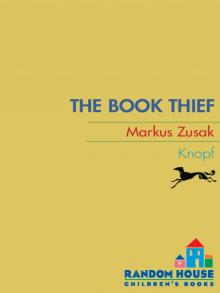 The Book Thief
The Book Thief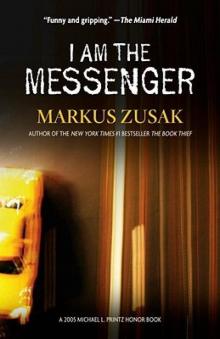 I Am the Messenger
I Am the Messenger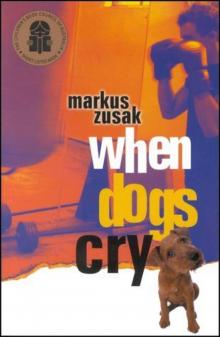 When Dogs Cry
When Dogs Cry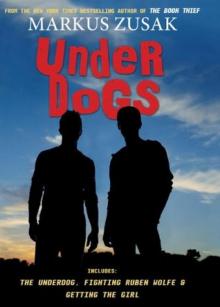 Underdogs
Underdogs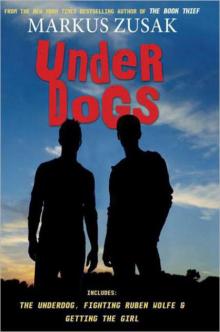 Underdogs: Three Novels
Underdogs: Three Novels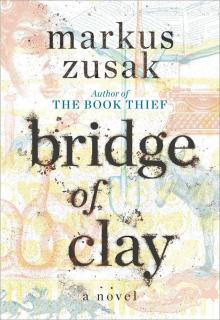 Bridge of Clay
Bridge of Clay